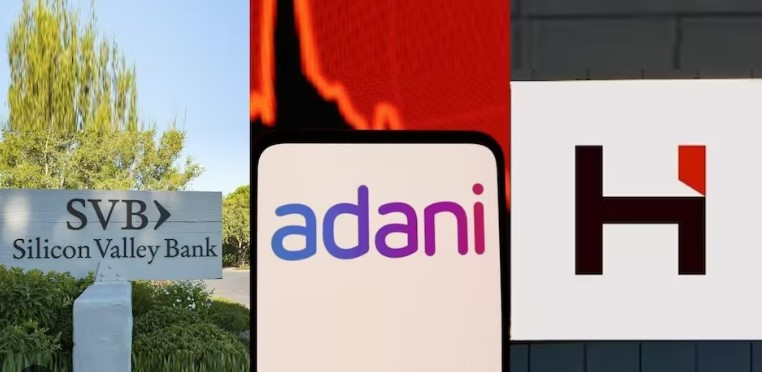Virendra Pandit
New Delhi: It was as if waiting to happen. But nobody thought it would happen so soon. In what has become America’s second bank collapse after Lehman Brothers in 2008, the very foundation of the US banking system has come under the scanner globally.
And, those who smelt the rat in Hindenburg Research’s January 24 “report” being a hatchet job to deliberately pulldown Adani Group companies’ stocks, and thereby blot the India Story, are rejoicing: the US-based short-seller could not see—or chose not to see for obvious reasons—the utter collapse of California-headquartered Silicon Valley Bank (SVB), America’s 16th largest bank, last week.
“Missed the US and did the hit job on India”, is how Hindenburg was trolled last weekend for targeting the Adanis while SVB collapsed within three days, something the short-seller did not see in its own backyard.
SVB, which was a big lender for technology start-ups, was abruptly shut down last week by the state regulator after it disclosed it had taken a USD 1.8 billion loss from a USD 21 billion sale of its bond holdings.
The closure was swift as the regulator took the control of the lender within a day after it informed it had run out of money and was raising fresh capital. On Thursday, shares of the bank’s parent SVB Financial crashed by a whopping 60 percent. The stock was down by another 60 percent in premarket trading on Friday, until being paused.
But what surprised many was the share sale by top executives of the bank itself, including CEO Gregory Becker, who sold USD 4.5 million worth of stocks just before the collapse. Now, many suspect the sale of shares by top executives just before the collapse may be a scam and that no agency could get the wind of it before it happened, the media reported on Monday.
Netizens are now slamming Hindenburg, whose voluminous report making wild claims led to the Adani stock rout worth over USD 150 billion, but failed to check what was happening in the banking system in its own country.
“Hindenburg report missed to see books of SVB in its very own country, but did the hit Job on the Adani in India,” a tweeter wrote. “It’s a clear case of conspiracy. Who would have got benefited politically?”
Hindenburg’s damaging report caused massive erosion of Gautam Adani’s and his investors’ wealth. The stocks of Adani group firms had, at one point, crashed nearly 80 percent, before making some recovery in the last few trading days following over Rs 15,000 crore capital infusion by a US-based investment fund, GQG.
Before publishing the report, Hindenburg had deliberately taken a short position in Adani group companies through US-traded bonds and non-Indian-traded derivative instruments.
Another Twitter user said he was waiting for Hindenburg to produce a report on SVB “but they won’t because they can’t short it now.”
A third Twitter user had this to say: “From USD 700 to USD 40, Silicon Valley Bank was shut down by the US regulators after it lost 95 percent of its market cap and went bankrupt. A loss of USD 110 billion to the shareholders. Seems like Hindenburg completely missed this shorting opportunity.”
Yet another user cautioned the investors thus: Silicon Valley Bank’s CEO, CFO, and CMO sold over USD 4.4 million in stock over the last two weeks. “But they didn’t know anything right?” she said, suggesting that the top executives knew the bank’s financial health.
“This is the western banking system. Investor Bill Ackman, who attacked Adani Group over the #Hindenburg report, now demands a bailout from the US govt for Silicon Valley Bank. Citibank India sold its retail banking to Axis Bank and moved out.” “Did any news agency speak about it? – why?” he asked.
On Friday, America’s billionaire investor Bill Ackman suggested that the US government consider a “highly dilutive” bailout for SVB. He said the failure of SVB could destroy an important long-term driver of the economy as Venture Capital-backed companies rely on the bank for loans and holding their operating cash. “If private capital can’t provide a solution, a highly dilutive govt preferred bailout should be considered,” he said.
However, Adani Group’s Chief Financial Officer Jugeshinder Singh, who led the firefighting for the group after the January 24 Hindenburg report, took a jibe at Ackman, saying: “Kid wants “mamma” to come help.”
Meanwhile, the Adani stocks are bouncing back steadily after the conglomerate pre-paid its share-based loans to lenders and staged roadshows overseas to restore investors’ confidence.

